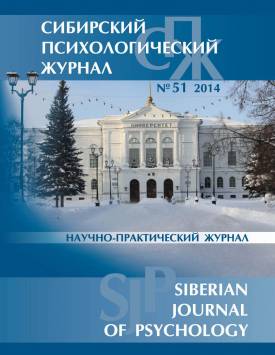Correlation between reflexion and social intelligence of firstand second-year students of research university
Reflection and social intelligence are considered as the competence which is necessary for the successful social adaptation and the involvement in social relations that relate to the main life spheres. The existence of the four research tendencies of reflection: cognitive, personal, communicative and cooperative are demonstrated. Social intelligence is regarded as the foresight and the ability to act wisely in interpersonal relationships; the ability to correctly judge people, to predict their behavior and to provide the adequate adaptation in interpersonal interactions; the group of mental abilities which are associated with the processing of social information; the social perception and the social thinking; the ability which allows to successfully learn the inner world of the personality, to differentiate interpersonal relationships and to predict the behavior in different situations. On the basis of a review of national and foreign papers the correlation between reflection and social intelligence is identified. Reflection and social intelligence ensure the existence of human activities in the social environment. Reflection is a structural element of social intelligence. This is especially true for social reflection, which shows itself in the form of man's awareness of how he is actually perceived and valued by other people. An empirical basis of the correlation between reflection and social intelligence is the D.A. Leontiev model of reflections and the concept of social intelligence by M. Ford and M. Tisak in the interpretation by S.V. Shcherbakov. D.A. Leontiev considers four reflexive processes: areflexia, introspection, quasireflection and system reflection. S.V. Shcherbakov understands social intelligence as the ability to implement meaningful goals in the appropriate social environment. The criterion of the measurement of the behavioral component of social intelligence is a successful problem solving. Social intelligence is manifested in the search for the optimal exit strategy from the complex, conflict situation. The Reflexivity Type Assessment Test by D.A. Leontiev and the Evaluation of Choice in Conflict Situations Questionnaire by S.V. Shcherbakov were used in the study. The sample consisted of 706 first- and second-year university students from 18 to 25 years whose majors were either humanities or science. Descriptive, correlation and factor analyses were used for the study data processing. It is shown that students have a medium degree of the reflexivity. Most students prefer such exit strategies from the complex, conflict interpersonal situation as compromise and cooperation, which indicates that students have the developed social intelligence. Students who have an inclination to system reflection prefer to compromise and try to find opportunities for cooperation in the complex, conflict situation.
Keywords
рефлексия, социальный интеллект, конфликтная ситуация, компромисс, сотрудничество, reflection, social intelligence, conflict situation, compromise, cooperationAuthors
| Name | Organization | |
| Matsuta Valeria V. | Tomsk State University | matsuta-vv@mail.ru |
| Bogomaz Sergey A. | Tomsk State University | bogomazsa@mail.ru |
References

Correlation between reflexion and social intelligence of firstand second-year students of research university | Sibirskiy Psikhologicheskiy Zhurnal – Siberian Journal of Psychology. 2014. № 51.
